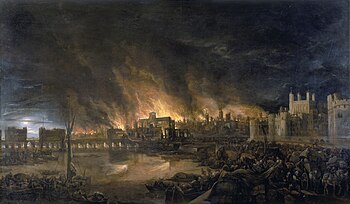Coping with adversity... The great fire of London
 In 1666 London was decimated by a fire that burnt almost the entire city to the ground. It was an incredible tragedy with many lives being lost, and of course many livelihoods and homes being destroyed.
In 1666 London was decimated by a fire that burnt almost the entire city to the ground. It was an incredible tragedy with many lives being lost, and of course many livelihoods and homes being destroyed.
However, have you ever considered that this tragedy could have had some positive outcomes? First among them was that the fire rid London of the 'plague' (black death) - the first city to be free from this deadly scourge! Second, the complete destruction allowed the architects of London to rebuild the city entirely. London became the first European city to cater for commercial trade on a large scale and to have significant forward planning for commercial and industrial growth. This, in large part, was what made London the 'premier' city in Europe (and in no small part contributed towards the building of the British empire).
I was wondering how we cope with adversity and challenge? The reality is that not all suffering has obvious positive benefits (certainly not in the short term!) However, we can learn some lessons from history.
Here's a short little video on dealing with suffering, adversity and challenge.
Rich blessing for this day!




 .
.
 .
.

3 Comments:
It is estimated that the Fire of London destroyed the homes of 70,000 of the City's ca. 80,000 inhabitants. It has been impossible to estimate the number of deaths - because of the cremating effect of the fire. It is thought that the deaths were of a seriously significant number.
But you suggest that this is a blessing in disguise - does this mean that the end justifies the means? The fire was a blessing if you were an aspirant businessman. But the fire was a disaster if you had lost your home - or your life! It all depends where you were standing during the fire.
By Rock in the Grass (Pete Grassow), at 9:47 AM
Rock in the Grass (Pete Grassow), at 9:47 AM
Actually remarkably few lives were lost. This was because the fire spread quite slowly. The main things lost were the stocks of shopkeepers, who sometimes moved them two or three times to safer places, only to have the fire reach them. Booksellers suffered particularly badly.
And people like Christopher Wren offered town planning schemes that would have been a vast improvement on the old one, but vested property interests meant that what rose from the ashes was largely according to the old plan. with a few new streets.
By Steve Hayes, at 12:11 PM
Steve Hayes, at 12:11 PM
Thanks Pete and Steve,
Pete, yup you're right! I recently read a remarkable book called 'Shock doctrine: The rise of Disaster Capitalism'- it says something very similar to what you list here. Of course balance is necessary... Suffering is very sad, but the question is what does one do in response? Do you do nothing? Or do you do what you can as long as you don't do anything unjust - perhaps even more strongly, as long as your actions and plans are just!
Steve, that is very interesting indeed! I would love to do a bit more reading on this.
Blessings,
Dion
By digitaldion (Dion Forster), at 2:45 PM
digitaldion (Dion Forster), at 2:45 PM
Post a Comment
<< Home